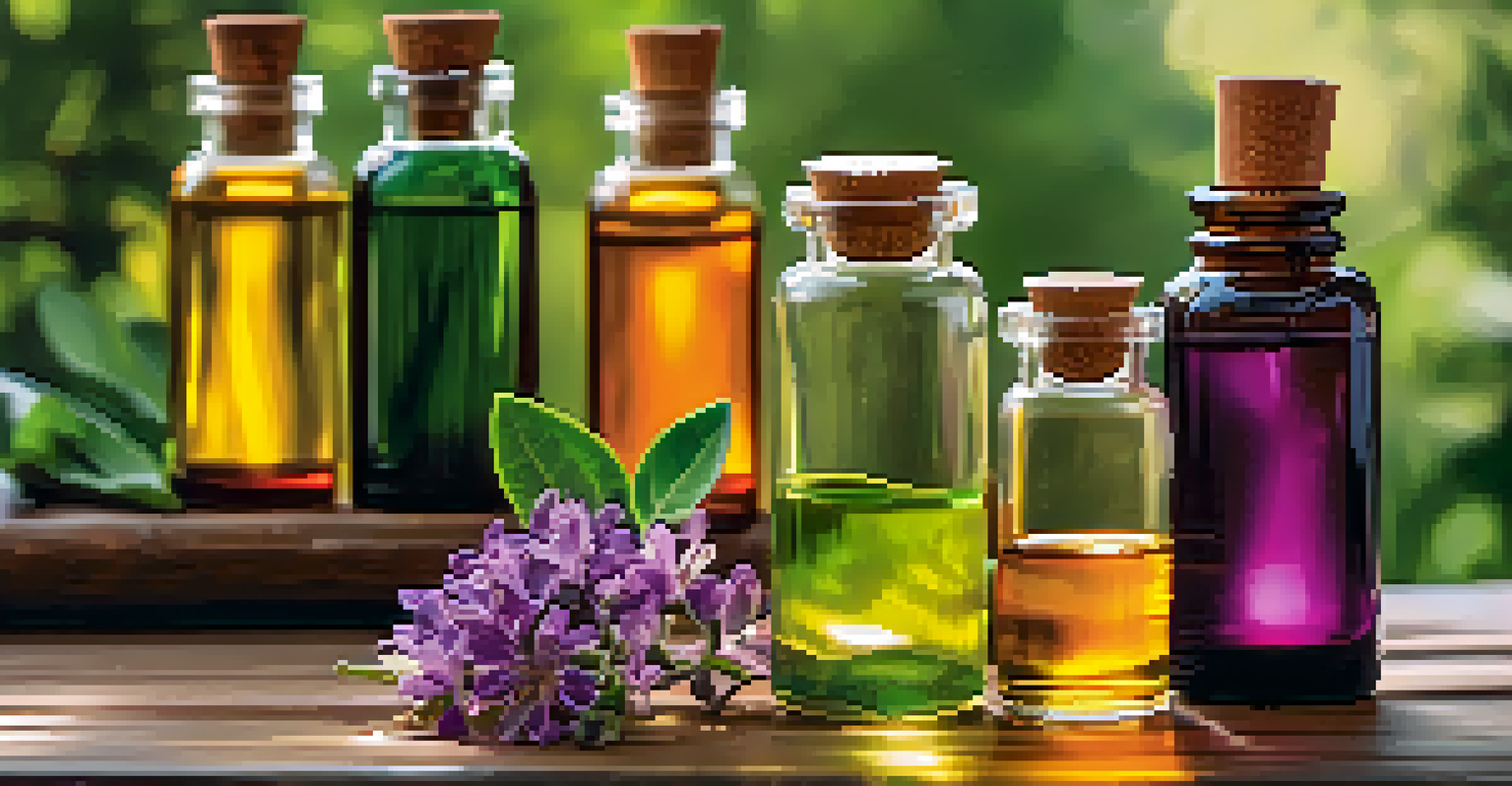The Science Behind Aromatherapy: How It Impacts Wellness

Understanding Aromatherapy: The Basics Explained
Aromatherapy is a holistic healing practice that uses essential oils extracted from plants to promote wellness. These oils can be inhaled, applied topically, or diffused in the air, creating a sensory experience that aims to enhance physical and emotional health. Think of it as a natural way to tap into the scents of nature, which can influence our mood and wellbeing.
The power of scent is not just in its ability to evoke memories, but in its capacity to heal and transform our emotional landscape.
At its core, aromatherapy leverages the connection between our sense of smell and our emotional state. When we inhale essential oils, the molecules travel to the olfactory system, which is closely linked to the brain's limbic system—the area responsible for emotions and memories. This is why a familiar scent can evoke strong feelings or memories, making aromatherapy a powerful tool for emotional balance.
By understanding how these aromatic compounds interact with our bodies, we can appreciate the profound impact they have on our wellness. Each essential oil has unique properties and potential benefits, such as promoting relaxation or boosting energy, which makes aromatherapy a versatile approach to self-care.
The Science of Smell: How Aromas Influence Our Brain
The science behind how aromas impact our brain is fascinating. When we smell something, the scent molecules bind to receptors in our nose, sending signals directly to our brain, particularly to the limbic system. This area of the brain plays a key role in our emotions, memory, and even certain physiological responses, making scent a powerful influencer of our mental state.

For instance, studies have shown that certain scents, like lavender, can promote relaxation and reduce anxiety. In contrast, citrus scents such as lemon or orange can uplift our mood and energize us. This illustrates how specific aromas can trigger different emotional responses and physiological effects, supporting the idea that aromatherapy can be tailored to individual needs.
Aromatherapy Enhances Wellness
Aromatherapy uses essential oils to promote physical and emotional health through the power of scent.
Understanding this connection allows us to consciously use scents to enhance our mood, manage stress, or even improve focus. It’s a beautiful reminder of how interconnected our senses are with our overall well-being.
Essential Oils: The Heart of Aromatherapy
Essential oils are the concentrated extracts of plants, capturing their natural fragrance and therapeutic properties. These oils are typically obtained through methods like steam distillation or cold pressing, preserving their unique characteristics. Each essential oil has its own profile of benefits, making them the star players in the world of aromatherapy.
Aromatherapy is a bridge that connects nature and well-being, allowing us to harness the healing properties of plants through their scents.
For example, tea tree oil is often praised for its antiseptic properties, making it a popular choice for skin care. On the other hand, peppermint oil is known for its invigorating scent, which can help clear the mind and boost concentration. This variety ensures that there’s an essential oil suitable for almost every wellness goal you might have.
When using essential oils, it's important to remember that they are highly concentrated. A little goes a long way, and they should be used with care, often diluted with a carrier oil for topical applications. This ensures not only effectiveness but also safety, allowing you to enjoy the benefits of aromatherapy fully.
How Aromatherapy Can Reduce Stress and Anxiety
One of the most celebrated benefits of aromatherapy is its ability to reduce stress and anxiety. Research indicates that certain scents can lower cortisol levels, the hormone associated with stress. For many, incorporating calming essential oils like lavender or chamomile into their daily routine can create a more soothing environment.
Imagine coming home after a long day and diffusing a blend of relaxing oils. The gentle aroma fills your space, promoting a sense of peace and tranquility. It’s like inviting a calming presence into your home, helping to wash away the stresses of the day and prepare your mind for rest.
Scents Influence Our Emotions
The connection between aromas and the brain's limbic system allows specific scents to trigger various emotional responses.
Aromatherapy practices, such as deep breathing in the presence of essential oils, can also enhance relaxation techniques like meditation or yoga. By combining these methods, you create a holistic approach to managing stress, where scents become allies in your journey toward emotional wellbeing.
Promoting Sleep: The Role of Aromatherapy
A good night's sleep is essential for overall wellness, and aromatherapy can play a significant role in promoting restful slumber. Scents like lavender, bergamot, and sandalwood are known for their calming properties, making them popular choices for those seeking to improve their sleep quality. These aromas can help signal to your body that it’s time to unwind and relax.
Using a diffuser in your bedroom or adding a few drops of essential oil to your pillow can create a calming bedtime ritual. This simple act can transform your sleeping environment into a sanctuary of tranquility, helping you drift off more easily and enjoy deeper, more restorative sleep.
Additionally, studies have shown that incorporating aromatherapy into your pre-sleep routine can reduce insomnia symptoms and improve overall sleep quality. It’s a gentle reminder that sometimes, the most effective solutions for better sleep can be found in the natural world around us.
Aromatherapy and Physical Health: Exploring Benefits
While aromatherapy is often associated with emotional wellness, its benefits for physical health should not be overlooked. Certain essential oils possess anti-inflammatory, antibacterial, and antiviral properties, which can support the body’s natural healing processes. For example, eucalyptus oil is frequently used to relieve respiratory issues and congestion.
Incorporating aromatherapy into your wellness routine can enhance your overall health. Whether it’s using peppermint oil to alleviate headaches or ginger oil to ease digestive discomfort, these natural remedies can provide relief without the need for harsh chemicals. It’s like having a toolbox of nature’s remedies at your fingertips.
Essential Oils Offer Natural Relief
Many essential oils provide therapeutic benefits, supporting both emotional balance and physical well-being.
However, it’s important to approach aromatherapy as a complementary practice rather than a replacement for medical treatment. Consulting with a healthcare professional can help ensure you’re using essential oils safely and effectively, maximizing their benefits for your physical health.
Getting Started with Aromatherapy: Practical Tips
If you’re ready to dive into the world of aromatherapy, starting is easier than you might think! Begin by selecting a few essential oils that resonate with you. Popular choices include lavender for relaxation, peppermint for energy, and lemon for mood lifting. Choosing oils that align with your wellness goals can make your experience more fulfilling.
Next, consider how you want to incorporate these oils into your routine. You can use a diffuser to disperse the aroma throughout your space, create a personal roller blend for topical application, or simply inhale directly from the bottle. Experimentation is key; find what works best for your lifestyle and preferences.

Lastly, remember to educate yourself about the safe use of essential oils. Always dilute oils for topical use, and consult guidelines to ensure you’re using them appropriately. With a little knowledge and creativity, you can seamlessly weave aromatherapy into your daily life, enhancing your wellness journey naturally.